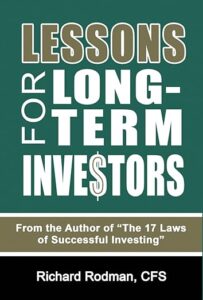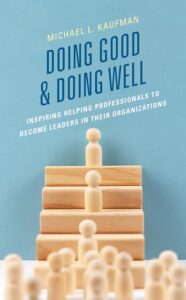In the expansive world of personal finance and investing, Richard Rodman is a seasoned guide with over five decades of experience in the complexities of wealth creation. His journey into this realm began inquisitively, sparked by a pivotal moment with his father, igniting a lifelong fascination with understanding investments for a better future. With a mission to demystify financial matters, Rodman has dedicated his career to empowering individuals—ranging from business owners to corporate executives at prestigious firms like AT&T, Johnson & Johnson, and Google—to unlock their wealth-creating potential.
As the author of Lessons for Long-Term Investors and a prolific writer contributing to many publications, Rodman’s insights are a beacon for financial literacy. His guidance extends beyond the boardroom, advocating for financial education among younger generations and fostering programs like the Stock Market Competition for Boys and Girls Clubs. We’re happy to have this opportunity to ask Richard Rodman some questions about his new book and for some more clues on navigating the world of finance and investing!
Could you share a bit about your personal journey in the world of finance and investing? What inspired you to become interested in this field?
Great question. About 60 years ago my father bought a stock that I followed in our local newspaper. One day, it disappeared. I asked why and my father said it went bankrupt. So I was fascinated by this and thought I should learn more about investing and so the journey began. I thought it was necessary if I wanted to have a better life.
What foundational financial concepts do you believe everyone should understand? How can individuals build a strong base of financial literacy?
Financial literacy is easy to attain. The information needed to be financially literate is all around
us. Hopefully one can start with my book Lessons for Long-Term Investors.
Budgeting is often considered the cornerstone of personal finance. How do you recommend individuals create and stick to a budget that aligns with their financial goals?
Yes, this is extremely important. What I say in the first section of the book which has 13 Laws of Investing is to pay yourself first each month. Make it a reasonable number. You will be surprised that you will be able to pay all your bills and invest as well. It is amazing how money falls into the cracks each month if you don’t have a plan.
The concept of an emergency fund is frequently discussed in personal finance. What advice do you have for establishing and maintaining an adequate emergency fund?
I would have about six months of emergency funds but to each his or her own. Whatever you feel comfortable with. Just don’t make it too much or you will be cheating yourself in the long run as investing should prove to be the more profitable over saving.
Debt can be a significant financial challenge. How do you suggest people approach managing and reducing different types of debt effectively?
If you are paying 18% for instance on credit card debt, if you reduce that, it is like investing with a return of 18%, which is very good. So, get rid of all debt that carries a high interest rate first.
 For someone who is new to investing, what are the fundamental concepts they need to grasp before they start building their investment portfolio?
For someone who is new to investing, what are the fundamental concepts they need to grasp before they start building their investment portfolio?
Know yourself. How much risk tolerance do you have? What are your goals and objectives? Do you have a plan to reach them?
Risk and return are interconnected in investing. How do you explain the concept of risk to new investors, and how can they balance risk and potential returns?
A good question. Risk can be commensurate with return and vice-versa. Everyone is different but only experience in investing can help you reach your comfort zone over time. I sometimes look for a potential reward to be at least two times the risk.
Asset allocation is a critical aspect of investment strategy. Could you explain the importance of diversifying investments across different asset classes?
Diversification is the only free lunch in investing. The first consideration is Asset Class diversification such as the breakdown between stocks, bonds, cash and CD’s, real estate, gold, and alternative investments such as art or collectibles. Secondarily, there is also diversification between large companies, mid-sized companies and small companies as well as between sectors of the economy such as technology, communications, consumer staples, consumer discretionary, industrials, materials, health care, etc.
What factors should individuals consider when deciding between a long-term investment approach and a short-term trading strategy?
Long Term works better for the vast majority of investors, hence my book Lessons for Long-
term Investors. It allows history to work for you over the long run, reduces risk and time spent on your portfolio.
How do you convey the power of compounding to someone who is just starting to invest? What role does the length of their investment horizon play?
Get a hold of a compound interest table and it will answer all questions. Einstein was once asked what the greatest invention of mankind was. He answered, “compound interest”. Warren Buffet learned this many years ago.
Retirement planning is a key aspect of personal finance. What steps do you recommend individuals take to ensure a financially secure retirement?
Know your time frame, risk tolerance, and goals and objectives. Also know that everyone is living longer, so stocks should always be part of your portfolio to be able to beat inflation, which is key. The goal is to make your money always work as hard for you as you did for it.
Tax implications can significantly affect investment outcomes. What strategies do you advise for making investments tax-efficient?
I am not a big proponent of having tax planning get in the way of returns. The exceptions are around the margins. An example would be if you had a position that should be sold, but you could wait a small period of time to take advantage of long-term capital gains treatment (a holding period of over one year) to get a lower tax rate on the sale.
Emotional biases can impact investment decisions. How can individuals become aware of these biases and make more rational financial choices?
Emotions are a big part of all this. Being emotional leads to bad investment decisions. First, ask yourself when markets are in turmoil if your goals and objectives have changed. If you are a long-term investor (as in the book title) realize that reacting to short term swings is not going to be your best interest. Know that history is on your side and trust it. Markets in a capitalistic society move higher over the long run. Yes, there are bumps and bruises along the way but if you construct a well thought out portfolio, you would be wise not to overreact to news events, good or bad.
Setting clear financial goals is crucial. How can someone identify their short-term and long-term financial objectives and create a plan to achieve them?
As mentioned, set a predetermined level of savings each month to move to investments on a disciplined basis (and of course invest what you have currently over and above an emergency fund). Goal should be long-term. Of course, as we age, we do get more conservative most of the time, so adjusting the portfolio is important as well, since our goals might change to more short term at that point.
The financial landscape evolves. What are your recommendations for individuals to stay informed about new investment opportunities, regulations, and trends?
Just keep reading. Today everything is so available. Keep reading and learning about
everything, but specifically about fundamental and technical analysis. They are the cornerstone
of assembling the best possible portfolio.
If you could offer one piece of advice to someone who is just starting their journey in personal finance and investing, what would it be?
It would be to START NOW and/or to START CHANGING over the path you have chosen if you feel it could be improved after reading the book.
Find the Author
About the Author
Richard Rodman, CFS, has spent over fifty years debunking the myth that creating wealth and dealing with financial matters is difficult to understand. As a result, he has devoted his career to helping  business owners, professionals, and top executives at companies such as AT&T, Supermarkets General, Johnson & Johnson, McGraw Hill, Cisco Systems and Google realize their wealth creating potential.
business owners, professionals, and top executives at companies such as AT&T, Supermarkets General, Johnson & Johnson, McGraw Hill, Cisco Systems and Google realize their wealth creating potential.
He is the author of the best-selling book, The 17 Laws of Successful Investing. In addition, his articles have appeared in PTA Today and Human Resource Professional magazines and he has written over 180 newsletters on the financial markets.
Mr. Rodman has also lectured on financial independence at many corporate venues with his seminar entitled “How to Create and Manage Wealth”. He is also devoted to financial education for younger generations and has established the Stock Market Competition Program for local Boys and Girls Clubs. He’s received a BS in Finance at Rider College where he was the recipient of the coveted Wall Street Journal Achievement Award.
He lives in New Jersey and Florida and enjoys family, golf, and travel.








